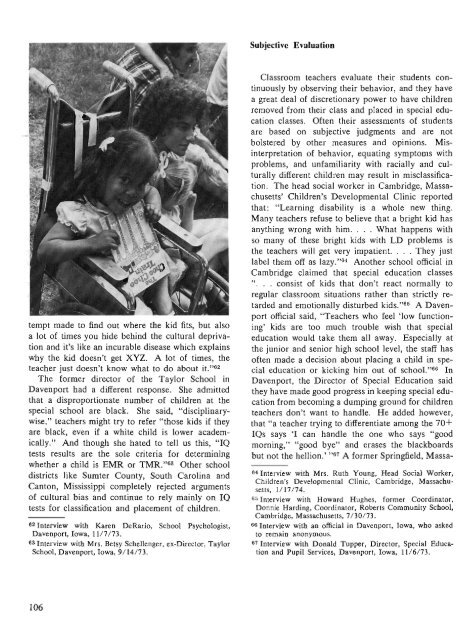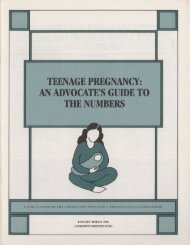children out of school in america - University of Tennessee Digital ...
children out of school in america - University of Tennessee Digital ...
children out of school in america - University of Tennessee Digital ...
You also want an ePaper? Increase the reach of your titles
YUMPU automatically turns print PDFs into web optimized ePapers that Google loves.
tempt made to f<strong>in</strong>d <strong>out</strong> where the kid fits, but also<br />
a lot <strong>of</strong> times you hide beh<strong>in</strong>d the cultural deprivation<br />
and it's like an <strong>in</strong>curable disease which expla<strong>in</strong>s<br />
why the kid doesn't get XYZ. A lot <strong>of</strong> times, the<br />
teacher just doesn't know what to do ab<strong>out</strong> it."62<br />
The former director <strong>of</strong> the Taylor School <strong>in</strong><br />
Davenport had a different response. She admitted<br />
that a disproportionate number <strong>of</strong> <strong>children</strong> at the<br />
special <strong>school</strong> are black. She said, "discipl<strong>in</strong>arywise,"<br />
teachers might try to refer "those kids if they<br />
are black, even if a white child is lower academically."<br />
And though she hated to tell us this, "IQ<br />
tests results are the sole criteria for determ<strong>in</strong><strong>in</strong>g<br />
whether a child is EMR or TMR."68 Other <strong>school</strong><br />
districts like Sumter County, S<strong>out</strong>h Carol<strong>in</strong>a and<br />
Canton, Mississippi completely rejected arguments<br />
<strong>of</strong> cultural bias and cont<strong>in</strong>ue to rely ma<strong>in</strong>ly on IQ<br />
tests for classification and placement <strong>of</strong> <strong>children</strong>.<br />
62 Interview with Karen DeRario, School Psychologist,<br />
Davenport, Iowa, 11 /7/73.<br />
68 Interview with Mrs. Betsy Schellenger, ex-Director, Taylor<br />
School, Davenport, Iowa, 9/14/73.<br />
106<br />
Subjective Evaluation<br />
Classroom teachers evaluate their students cont<strong>in</strong>uously<br />
by observ<strong>in</strong>g their behavior, and they have<br />
a great deal <strong>of</strong> discretionary power to have <strong>children</strong><br />
removed from their class and placed <strong>in</strong> special education<br />
classes. Often their assessments <strong>of</strong> students<br />
are based on subjective judgments and are not<br />
bolstered by other measures and op<strong>in</strong>ions. Mis<strong>in</strong>terpretation<br />
<strong>of</strong> behavior, equat<strong>in</strong>g symptoms with<br />
problems, and unfamiliarity with racially and culturally<br />
different <strong>children</strong> may result <strong>in</strong> misclassification.<br />
The head social worker <strong>in</strong> Cambridge, Massachusetts'<br />
Children's Developmental Cl<strong>in</strong>ic reported<br />
that: "Learn<strong>in</strong>g disability is a whole new th<strong>in</strong>g.<br />
Many teachers refuse to believe that a bright kid has<br />
anyth<strong>in</strong>g wrong with him. . . . What happens with<br />
so many <strong>of</strong> these bright kids with LD problems is<br />
the teachers will get very impatient. . . . They just<br />
label them <strong>of</strong>f as lazy. "64 Another <strong>school</strong> <strong>of</strong>ficial <strong>in</strong><br />
Cambridge claimed that special education classes<br />
"... consist <strong>of</strong> kids that don't react normally to<br />
regular classroom situations rather than strictly retarded<br />
and emotionally disturbed kids. "65 A Davenport<br />
<strong>of</strong>ficial said, "Teachers who feel 'low function<strong>in</strong>g'<br />
kids are too much trouble wish that special<br />
education would take them all away. Especially at<br />
the junior and senior high <strong>school</strong> level, the staff has<br />
<strong>of</strong>ten made a decision ab<strong>out</strong> plac<strong>in</strong>g a child <strong>in</strong> special<br />
education or kick<strong>in</strong>g him <strong>out</strong> <strong>of</strong> <strong>school</strong>."66 In<br />
Davenport, the Director <strong>of</strong> Special Education said<br />
they have made good progress <strong>in</strong> keep<strong>in</strong>g special education<br />
from becom<strong>in</strong>g a dump<strong>in</strong>g ground for <strong>children</strong><br />
teachers don't want to handle. He added however,<br />
that "a teacher try<strong>in</strong>g to differentiate among the 70+<br />
IQs says 'I can handle the one who says "good<br />
morn<strong>in</strong>g," "good bye" and erases the blackboards<br />
but not the hellion.' "67 A former Spr<strong>in</strong>gfield, Massa-<br />
64 Interview with Mrs. Ruth Young, Head Social Worker,<br />
Children's Developmental Cl<strong>in</strong>ic, Cambridge, Massachusetts,<br />
1/17/74.<br />
65 Interview with Howard Hughes, former Coord<strong>in</strong>ator,<br />
Donnie Hard<strong>in</strong>g, Coord<strong>in</strong>ator, Roberts Community School,<br />
Cambridge, Massachusetts, 7/30/73.<br />
66 Interview with an <strong>of</strong>ficial <strong>in</strong> Davenport, Iowa, who asked<br />
to rema<strong>in</strong> anonymous.<br />
67 Interview with Donald Tupper, Director, Special Education<br />
and Pupil Services, Davenport, Iowa, 11/6/73.














